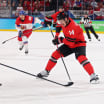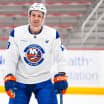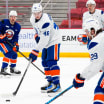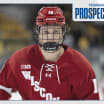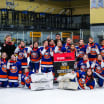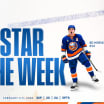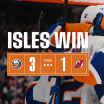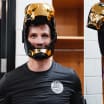Longhorns and Long Island don't really have too much in common, but deep in the heart of Texas, the New York Islanders have a hockey legacy.
From 1974 to 1979, the Fort Worth Texans were the Islanders top minor league affiliate, and it was the Texans who delivered the organization's first championship, winning the Central Hockey League title in 1978.
Islanders Have Hockey Legacy in Fort Worth
Fort Worth Texans won the organization's first championship with Central Hockey League title in 1978
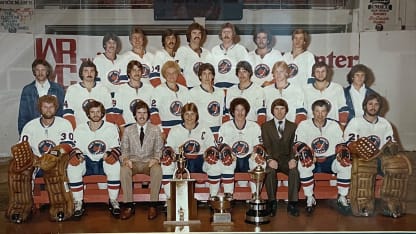
By
Cory Wright
NewYorkIslanders.com
"It was great hockey, it was the number one farm team back then," Richie Hansen said. "We actually won the first championship of the organization."
The Texans had a split affiliation between the Islanders and the Minnesota North Stars during that championship season. Familiar names include Bob Lorimer, who won two Stanley Cups with the Islanders in 1980 and 1981 before being traded to the Colorado Rockies, as well as Doug Rombough, who was traded to Minnesota in the JP Parise deal in 1975. When Rombough arrived in Fort Worth, he was doing so as a member of the North Stars organization.
Bill MacMillan served as a player-coach for Fort Worth. After a seven-year NHL career, which included three-and-a-half seasons with the Islanders, as well as being taken by the Atlanta Flames in the 1972 Expansion Draft, the veteran became a real-life Reggie Dunlop, helping guide the organizations prospects.
"I was coming to the end of my playing career with the Islanders and Al Arbour asked if I would consider going to Fort Worth and coaching the farm club," MacMillan said. "It was kind of a softening way to end your career, you know, at least that wasn't going to be right to out."
#FlashbackFriday Did you know Dallas & Fort Worth had a legendary hockey rivalry as they both competed in the CHL from 1967-1982? The Black Hawks & Fort Worth Wings/Texans rivalry included bench clearing brawls & fights in the stands, including a 10-cent beer night riot in 1978. pic.twitter.com/taSY8cMd5e
— Texas Sports History (@TXSportsHistory) May 13, 2022
MacMillan had 14 points in 43 games as a player-coach in the championship season, before stepping into a full-time coaching role the next year. He was an Assistant Coach with the Islanders when the team won its first Stanley Cup in 1980.
"Many of the Islanders I knew through the years of training camp even if they didn't stick," MacMillan added. "It was a welcome move for me and that turned out to be my most enjoyable season to that date until the Stanley Cup."
The Texans played out of the Will Rogers Coliseum in Fort Worth, which is about 30 miles west of Dallas, the home of their fiercest rivals, the Dallas Black Hawks. In fairness, most of the rivalries were pretty intense in the CHL, given only six teams started in the 1977-78 season, with four making the playoffs. Only five teams even concluded the regular season due to the Phoenix Roadrunners folding after just 27 games.
The Will Rogers Coliseum was primarily a venue for rodeos, with six-foot concrete walls behind the bench forming a ring around the center and plenty of dirt being shifted and out of the arena bowl. Mike Hordy, a fifth-round draft pick by the Islanders in 1976 who spent six years in the organization between IHL Muskgeon, CHL Fort Worth and Indianapolis, recalled the ice surface being bigger, which played into his game as a defenseman. Hordy won the Bob Gassoff Trophy in 1978 for the league's most improved defenseman with 49 points (14G, 35A) in 76 games.
Hansen, a Northport native, said he definitely remembered the smell at Will Rogers Coliseum, which really emphasized the barn in old barn.
"Every time we were on the road they had something going on and we'd come back and it just stunk like horse [manure]," Hansen said with a laugh. "We had it good… It was almost like the old [Nassau] Coliseum people are right there right on top of you. Every time we played Dallas It was packed so it was good."
Hordy, Hansen and goalie Don Cutts talked about the culture shock of growing up and playing hockey in Canada and the northeast before moving to the heart of Texas. They appreciated the warm weather and being able to go to practice in shorts, or golf on Christmas, as well as southern hospitality. Cutts, Hordy and another teammate embraced the Texas lifestyle and rented a 10-acre ranch they nicknamed The Ponderosa, a five-bedroom house that became the setting for team parties.
"It was a ranch type place with horses in the backyard and stuff like that," Hordy said. "It was pretty bizarre being there."
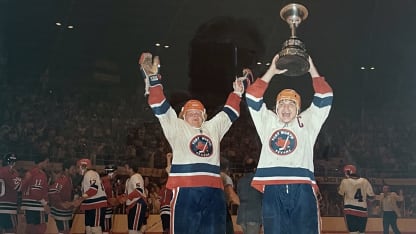
They all recalled decent fan support, buoyed by the team's success as well as the local rivalry with Dallas. Cutts recalled some rowdy crowds on 10 cent beer nights - including some beers being thrown over the glass at him. Hansen once had a similar experience sitting in the crowd while he was out with injury and being swept up in a brawl alongside a teammate.
"The people that came to the game, they followed for years and we had an excellent Booster Club," MacMillan said. "they treated us like we were the top team alright."
On Long Island, Hansen's claim to fame is being the first Long Islander to play and score for the Islanders. His NHL career was short, but in the CHL, Hansen was a force, with 546 points (183G, 363A) in 523 games. Hansen led the Texans with 78 points (25G, 53A) in the 1977-78 season and assisted on Kelly Greenbank's championship clinching goal in overtime of game seven.
"That was probably one of my best years in hockey because, you know, everything just seemed to fall into place," Hansen said.
The Texans went 44-29-3 that season, finishing atop the six-team league. They beat the Tulsa Oilers in seven games in the playoff semifinals and bested Dallas in overtime of Game Seven for the Adams Cup.
Bill Torrey, Al Arbour and Jim Devellano were in attendance the night the Texans won their title, as the Islanders had been knocked out of the playoffs by the Toronto Maple Leafs 2-1 in a seven-game upset in the second round. With the brain trust on hand, the Texans were able to exact a little revenge, as Dallas was Toronto's top affiliate at the time.
"We came into the locker room to Al and Bill in there and we're all dancing to We Are The Champions," Hansen said. "They went around, shook everybody's hand and so it was nice that they came down and I guess they wanted to see what they had."
Cutts recalls Arbour making his way back to the ranch that night for the after party - and having to clean up the black marks the coach's shoes left on their wood tile floor.
Hansen and Hordy talk about their Fort Worth days with pride, especially delivering the organization its first championship, even if they weren't able to play on the Islanders dynasty teams. Hordy appeared in nine games during the 1979-80 season, but spent a majority of the year in Indianapolis, while Hansen was transferred to Minnesota in June 1979 as compensation for the Islanders signing Jean Potvin.
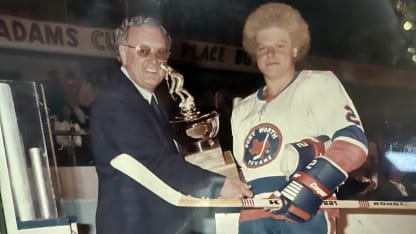
"Even though most of my career was in the minors, it was just it was great to be part of that team at that timeframe," Hordy said. "I might have been a sixth or seventh or eighth defenseman behind you know, five guys that won four Stanley Cups, it was great to be part of the franchise and still is."
Hansen was at Nassau Coliseum the night the Islanders won their first Stanley Cup and went down to the locker room to congratulate them. In the room he ran into Arbour, who had the Stanley Cup in his hands and passed it to Hansen.
"He said 'Richie, I want you to take a sip out of this Cup because you're a part of it,'" Hansen said. "He didn't have to. It's something I'll never forget. And when I tell that story, it just chokes you up, you know?"
It's hard to quantify how much of an impact the Texans - and the Black Hawks - had in helping bring NHL hockey to Dallas. Fort Worth had a pair of short-lived teams in the 1940s, before a 15-year run from 1967-82, and later stints in the 1990s and 2000s. The members of the Texans would like to think the success they had may have played at least a small role in growing the game.
"It was good hockey," Hansen said. "They've got a lot of hockey fans now. It was good for the area good for the league."



